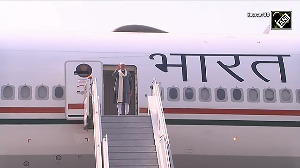Retail finance with greater use of technology will be the key driver of growth for the Indian financial sector over the next 2-3 years, according to K V Kamath, the CEO of ICICI Bank.
Addressing a session on 'Managing a country's money: Prudence not miracles' at the CII Partnership Summit, Kamath said that despite the fast growth of retail finance sector at a compounded growth rate of 45 per cent in the last six years, the market continued to be under-penetrated in comparison to its peers.
Analysing that the Indian economy had strong fundamentals with GDP growing at an average rate of 5.5 per cent over the past five years, inflation rate dropping from an average of 10 per cent in early 90s to around 3 per cent at present, forex resrves touching $ 70 billion mark and current account defcit decreasing from 1.7 per cent of GDP in 1996 to 0.5 per cent in 2001, Kamath said that there were improving trends even in the banking sector.
Kamath felt that though the NPA levels need to be improved, it compared favourably at 8 per cent of the GDP as against 43 per cent in China and Thailand, 40 per cent in Malaysia, 30 per cent in Japan and 15 per cent in South Korea.
The new securitasation act has been helping the banking industry by bringing the lenders and borrowers back to the negotiating table, Kamath said.
"With the act in place, the access to the window of BIFR has been removed and borowers are coming to negotiating table," Kamath observed.
Contrary to the optimistic scenario presented by Kamath at the session, T N Srinivasan, the economics professor at Yale University, US, said that there were many paradoxes in India'a macro-economic outlook in terms of mounting capital account defcit while there was a current account surplus, low level of inflation despite the drought situation and foreign exchange reserves tuching $ 70 billion despite slow flow of FDIs.
Srinivasan said that the 'new' Hindu growth rate of 5-5.5 per cent that the country had been achieving now would not help just as the 'old' Hindu growth rate of 2.5 per cent did not help in the past.
The precursors to achieve 8 per cent growth rate are : clearing NPAs fast and preventing recurrence of mounting NPAs; big push for privatisation and labour reforms; and achieving socio-political and economic consensus for the blue print for reforms, he stated.
Sharing his views on the difficult financial markets over the last 3 years, Howard Davies, the chairman of Financial services authority, UK, said that the puncturing of the dotcom bubble, diappointed expectations about the recovery and a crisis of confidence in corporate reporting had come to gether in a dangerous cocktail.
He called for a stabe financial system, well capitalised banks, better corporate governance and progress towards global accounting standards, especially towards principle-based accounting as in the UK than rule-based accounting in US. He favoured the integrated regulator model for the financial sector.






 © 2025
© 2025